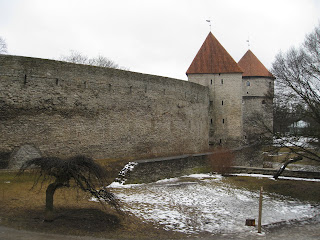Having finished
Orlando Figes's impressive book Natasha's Dance (which sure has taken me some time), I have been intrigued
by three authors that I have not yet read anything of - Bunin, Nabokov and
Tsvetaeva. Unfortunately, I'm not big on poetry, but I will give it a serious
try for the sake of Tsvetaeva, and I actually have no idea what Bunin wrote, but I was intrigued while reading about it so it must have been something interesting.
Both Nabokov and
Tsvetaeva intrigue me by being émigré writers. Bunin as well, but as I said, I can't remember what he wrote about all too well. I'll write about him another time. Have you ever thought about how
much more sophisticated "émigré" sounds than... well, what they really were,
refugees or immigrants? No one likes an immigrant, but an émigré member of the Russian intelligentsia? Ah, how chic!
Being more or less chic, they were writing outside of their - so to speak -
natural habitat, or outside of what they believed was their true home, or the essence of it. I find
the displacement of people intriguing, be it in the context of forced
emigration or voluntarily moving abroad, or the use of another language than one's native as one's primary mode of expression (minority literature in major languages, such as Kafka). What happens to a person's identity? Is identity a stable thing, formed in your childhood, and if so,
do you ever really fit in when you move away? Or is it ever-changing and do people place too much weight on ending up somewhere else than where you were born? How long do you remain a foreigner? When do you
acquire the right to have an opinion of your new country, without getting
"what would you know, it's not your country"? People who move abroad
themselves can often not distance themselves from the petty feeling of
proprietorship towards their countries, even though they, undoubtedly, must
experience estrangement in their host countries. Stravinsky, himself an émigré
who only returned to Russia in the 60's for a visit, said "Yet the right to
criticise Russia is mine, because Russia is mine and because I love it, and I
do not give any foreigner that right." I wonder if he ever felt like criticizing, for example, France?
Nabokov in that way feels like a
perfect Russian émigré gone American (who would not tolerate anyone criticizing America!), having grown up speaking and writing
English before he learned to write in Russian. When his Russian reading audience was diminishing, he simply switched to English. Figes quotes his poem To Russia (1939), which I think suits the situation very well. This is a part of it:
He who
freely abandons his country
On the
heights to bewail it is free.
But now I am
down in the valley
And now do
not come close to me.
I'm prepared
to lie hidden forever
And to live
without a name. I'm prepared,
Lest we only
in dreams come together,
All
conceivable dreams to forswear;
To be
drained of my blood, to be crippled,
To have done
with the books I most love,
For the
first available idiom
To exchange
all I have: my own tongue.
For Tsvetaeva, who ended up
in Paris, I think it was more difficult:
"From a world
where my poems were as necessary as bread I came into a world where no one
needs poems, neither my poems nor any poems, where poems are needed like -
dessert: if anyone -needs - dessert..."
Sometimes I really
need dessert.
No one wanted to read her poems, she wasn't understood by her fellow Russian emigrants, and Tsvetaeva ended up
returning to the Soviet Union with her husband, perhaps not really wanting to,
but imagining that she would be appreciated there and find a reading audience
again. That didn't happen. Instead her husband was arrested and shot, her daughter
sent to a gulag, and she killed herself. Her first daughter also died, before
the emigration, and no one (including her son) went to her funeral. How's that
for tragedy?
Immigration
is always a hot topic, and especially so today when more and more European
countries are becoming outright fascist - or at least contain fascist elements
that grow stronger and stronger. The statistics, the surface manifestation
of immigration are interesting in their own right. Who benefits from
immigration? Why do people become so obsessed with their national purity only when they believe it to be threatened? What moral responsibilities do advanced societies have towards the
less fortunate who choose to emigrate? The inner workings of individual
experiences are equally interesting, and largely ignored in the public debate,
which is, might I add, raging in my increasingly more embarrassing native
country. And is there a more pleasant way to explore it than through literature?
That being
said, I haven't yet started on my mission to explore émigré litterature. I have
read some, like Andreï Makiné (who is a later example of an émigré author), but not in any conscious kind of way. If anyone
has any recommendation for Nabokov, for example, or other authors, feel free to
leave a comment.





























